Los 10 errores más importantes que evitar en la comprobación de cables
5 de junio de 2025 / General, instalación y comprobación, actualización y resolución de problemas
Las personas inteligentes que instalan, comprueban y certifican instalaciones de cableado de red comprenden la importancia de cumplir con parámetros de rendimiento basados en normas y de garantizar el soporte de la aplicación; sin embargo, cualquiera puede cometer errores que afecten negativamente los resultados finales y la satisfacción del cliente. Estos son los 10 errores más importantes que debe evitar a la hora de comprobar sistemas de cableado de red.
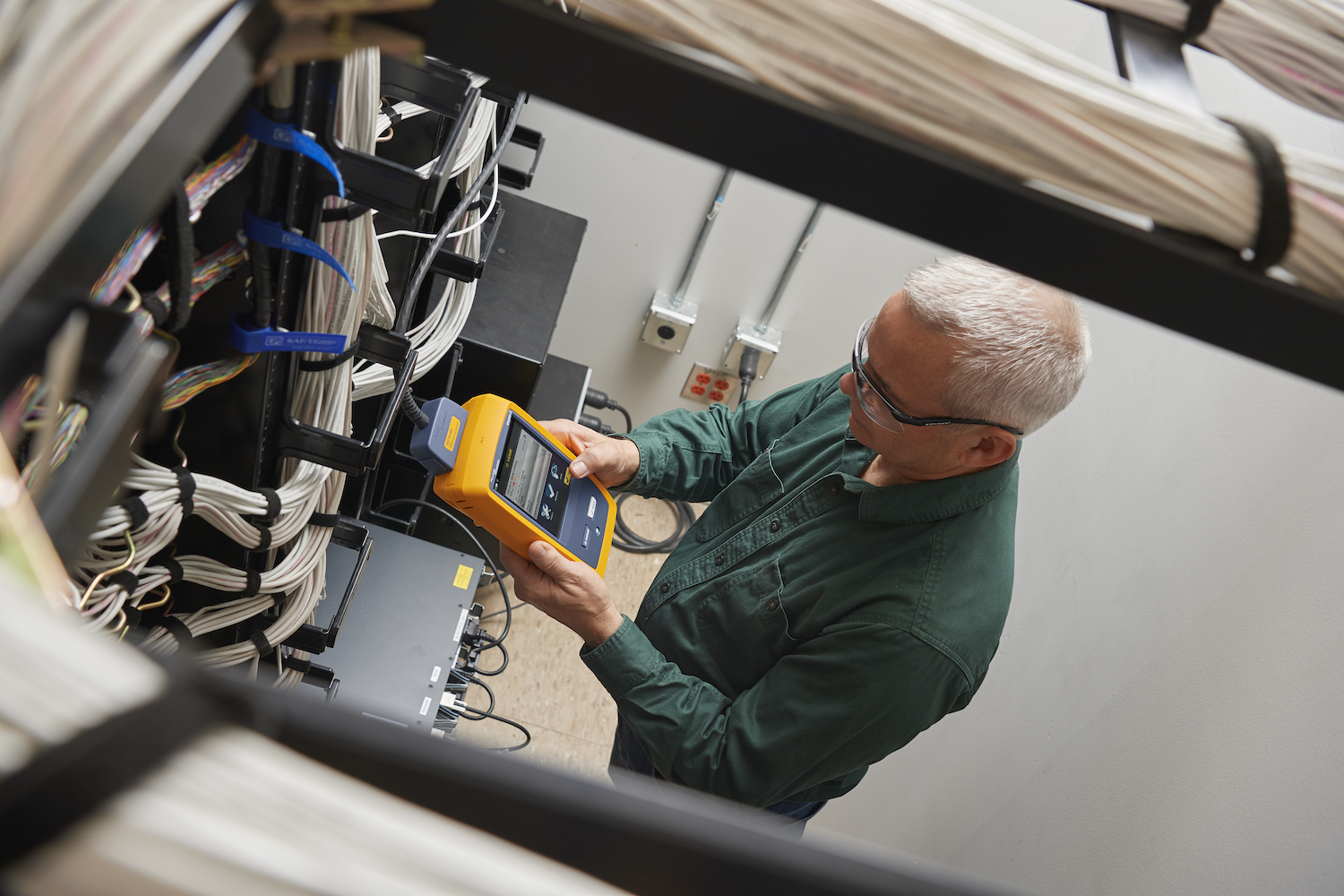
n.° 1: Falta de acuerdo sobre los parámetros de comprobación
En lo que respecta a la certificación de una instalación de cableado de cobre, las normas del sector como ANSI/TIA-568.2 e ISO/IEC 11801 especifican parámetros básicos de rendimiento, entre los que se incluyen:
- • Pérdida de inserción (IL)
- • Pérdida de retorno (RL)
- • Diafonía en el extremo cercano y diafonía en el extremo lejano (NEXT y FEXT)
- • Para la categoría 6A, también se exige la comprobación de Alien Crosstalk, ya que se trata de un parámetro de rendimiento clave que puede afectar la capacidad de operar de 10GBASE-T.
La comprobación en campo puede incluir parámetros de equilibrio opcionales adicionales.
- • El desequilibrio de resistencia de CC calcula la diferencia de resistencia de CC entre conductores dentro de un par y entre pares, que indican si se admite potencia sobre ethernet (PoE).
- • La pérdida de conversión transversal (TCL) y la TCL de igual nivel (ELTCTL) miden la señal de modo común dentro de un par, lo que indica el equilibrio adecuado para inmunidad al ruido (incluida Alien Crosstalk).
El límite de comprobación predeterminado de un certificador DSX CableAnalyzer™ es (+PoE), que incluye desequilibrio de resistencia de CC. La elección del límite de comprobación (+All) añade los parámetros de TCL y ELTCTL.
La certificación de un sistema de cobre técnicamente requiere la comprobación según los parámetros especificados por las normas del sector para la aplicación, incluida Alien Crosstalk para la categoría 6A. Sin embargo, en definitiva los parámetros que compruebe dependen de la especificación del proyecto del cliente, independientemente de lo que indiquen las normas o recomienden los expertos del sector. Si la especificación exige una garantía de instalación del cableado, también debe comprobar los parámetros que exige el fabricante del cableado.
Sin duda querrá evitar el tiempo y los gastos de volver a comprobar parámetros que pasó por alto la primera vez. Por eso es esencial que se comunique con su cliente y con el fabricante del cableado para acordar todos los parámetros de comprobación de antemano. Esto también le ayudará a calcular los costes del proyecto y le preparará para el trabajo, lo cual incluye asegurarse de que su comprobador pueda comprobar todos los parámetros especificados, sobre todo aquellos más nuevos, como desequilibrio de resistencia de CC, TCL y ELTCTL. Por fortuna, estos parámetros pueden comprobarse con un certificador DSX CableAnalyzer™ de Fluke Networks.

Acordar la comprobación de antemano también es necesario para la comprobación de fibra. Asegúrese de que usted, su cliente y el fabricante de cableado estén de acuerdo en realizar comprobaciones de fibra de nivel 1 o nivel 2 para saber si necesita un reflectómetro óptico en el dominio del tiempo (OTDR) además del juego de comprobación de pérdida óptica (OLTS).
- • La comprobación de nivel 1 con un OLTS proporciona la medición más precisa de la pérdida de inserción a lo largo de un enlace de fibra y es un requisito de las normas del sector.
- • La comprobación de nivel 2 con un OTDR es una comprobación ampliada que caracteriza la pérdida de inserción y la reflectancia de los empalmes y conectores individuales a lo largo del enlace de fibra. Tenga en cuenta que si usted y el cliente acuerdan una comprobación de nivel 2, el uso de un OLTS sigue siendo necesario para garantizar el cumplimiento de la aplicación, ya que mide con precisión la pérdida total de inserción.
n.°2: No ponerse de acuerdo sobre los resultados de comprobación marginales
Como instalador, espera que todas las comprobaciones de cables conformes a las normas tengan un resultado de pase. Sin embargo, todo, desde las prácticas de instalación hasta la calidad de los componentes y del comprobador, pueden ser suficientes para llevar los resultados de la comprobación de un enlace al rango de pase marginal, en el que el resultado está más cerca del límite de la comprobación que de la precisión publicada por el fabricante del comprobador en campo. Según las normas de la TIA y la ISO/IEC, cualquier aprobación marginal se considera que pasa y es conforme. Además, las normas indican específicamente que los resultados de comprobación marginales para un parámetro deben marcarse con un asterisco (*). Esto indica claramente que la precisión del comprobador es importante.
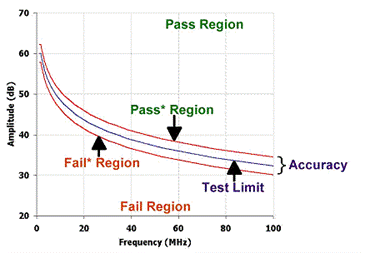
La selección de un comprobador que cumple las normas del sector, como el certificador de cables Versiv™ de Fluke Networks, que ofrece una precisión excepcional y repetible, puede minimizar resultados de comprobación marginales. Cualquier comprobador que le permita deshabilitar el asterisco y ocultar los resultados marginales incumple las normas, sin mencionar que puede poner en riesgo su reputación y su negocio. Además, procure que su comprobador esté en perfectas condiciones actualizando el firmware, revisándolo y calibrándolo según sea necesario y asegurándose de que los adaptadores de enlace permanente no estén desgastados.
Pese a los esfuerzos, habrá pases marginales, principalmente si el enlace contiene una conexión cruzada o un punto de consolidación que añade conexiones adicionales. Algunos clientes podrían negarse a aceptar un pase marginal, preguntándose qué pasó con su supuesto sistema de cableado de alta calidad. Es entonces que debe asegurarse de que usted está cubierto. Recuerde lo que dicen las normas: a menos que se haya especificado y acordado por escrito que los resultados de comprobación marginales no son aceptables, los pases marginales siguen siendo aprobados. Acordar de antemano los resultados de comprobación marginales es una decisión inteligente.
n.°3: Improvisar la comprobación de Alien Crosstalk
Si bien la especificación del proyecto del cliente o los requisitos de garantía del fabricante determinarán los parámetros de comprobación, es probable que necesite realizar una comprobación de Alien Crosstalk para cualquier instalación de categoría 6A, incluidas PS ANEXT y PS AACR-F. Es la única manera de demostrar el cumplimiento para las aplicaciones 10GBASE-T, y la mayoría de los proveedores de cableado no conceden la garantía del sistema sin ella.
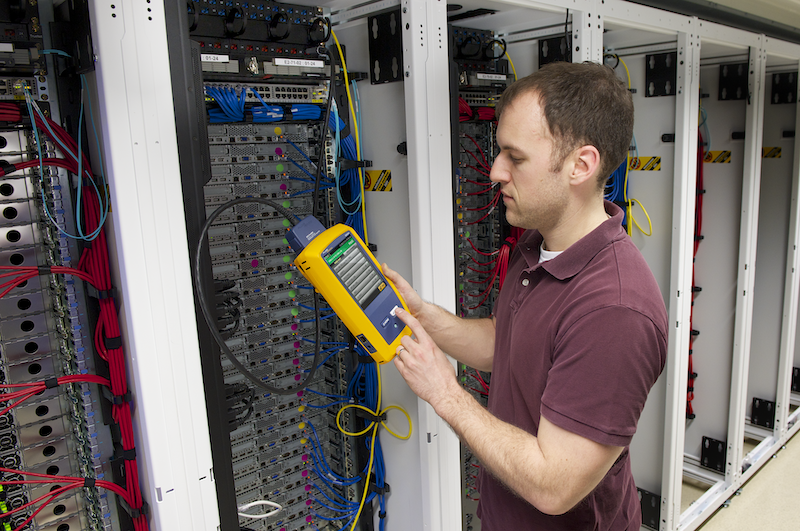
Solo se puede evitar la comprobación de Alien Crosstalk si no se especifica y el cliente y el proveedor de cableado acuerdan no comprobarla. Aunque piense que no es económicamente viable o práctico comprobar que todos los enlaces cumplen la especificación de Alien Crosstalk, no se preocupe. Las normas del sector le permiten especificar un tamaño de muestra para la comprobación de Alien Crosstalk en función de las recomendaciones que se muestran en la tabla. La norma recomienda la comprobación de una cantidad igual de enlaces perturbados cortos, medios y largos. También indica que, si tres de cada uno de estos enlaces perturbados supera un margen de 5 dB, es apropiado interrumpir la comprobación.

Tamaños de muestras recomendados para la comprobación de Alien Crosstalk
Al elegir los enlaces perturbados, no seleccione aquellos que terminan en un extremo de una fila de conectores: este no es el peor caso posible. El enlace perturbado debe estar rodeado de conectores arriba y abajo. Sin embargo, asegúrese de que los perturbadores estén en el mismo haz; la Alien Crosstalk entre haces de cables no se considera significativa.
El cable blindado ofrece una inmunidad al ruido muy superior en comparación con el cable no blindado, y apenas debería presentar Alien Crosstalk. Sin embargo, un blindaje abierto (no conectado) en un cable blindado puede dar lugar a un fallo en la comprobación de Alien Crosstalk. Esto puede ser causado por no instalar el blindaje correctamente, como la fijación con abrazadera en la parte no conductora de la lámina en el cableado. Mientras que la mayoría de los comprobadores buscan una simple continuidad entre el blindaje de la unidad principal y el blindaje en la unidad remota, una señal buscará una manera de llegar a la unidad remota, incluso a través de la conexión a tierra común del edificio a la que están conectados los paneles de conexión y racks. Eso significa que el comprobador mostrará un blindaje conectado incluso cuando está abierto. Puede evitar esta situación con un certificador DSX CableAnalyzer™ que informa los problemas de integridad de distancia a blindaje usando una técnica de medición patentada.
Si todavía cree que puede improvisar las comprobaciones de Alien Crosstalk, piénselo dos veces. Si lo exigen las especificaciones o para una garantía, debe especificar un tamaño de muestra según las recomendaciones de las normas, ya sea que el cableado esté blindado o no. De no ser así, corre el riesgo de tener que comprobar la Alien Crosstalk en todos los enlaces, lo cual es un descuido muy costoso.
n.°4: Comprobar el canal en lugar del enlace permanente
En una red, el canal conecta un dispositivo activo con otro, incluidos los latiguillos y los cables de equipos. Esto podría ser desde un switch de acceso hasta un servidor en el centro de datos, incluidos los latiguillos en conexiones cruzadas o interconexiones. En la LAN, podría ser desde un switch de acceso en una sala de telecomunicaciones hasta un ordenador portátil, una cámara, un punto de acceso Wi-Fi u otro dispositivo, incluido el latiguillo desde el switch hasta el panel de conexión y el cable del equipo desde el tomacorriente hasta el dispositivo. Las normas del sector limitan la longitud general de un canal a 100 metros, que incluyen hasta 90 metros de cableado y no más de 10 metros de latiguillos.
El enlace permanente es la parte fija del canal hasta 90 metros. Suele consistir en el cable que va de un panel de conexión a otro panel de conexión en el centro de datos, o de un panel de conexión a una roseta en un área de trabajo o un punto de consolidación en la LAN.

La correcta transmisión de datos depende del rendimiento del canal, ya que es el enlace completo de extremo a extremo a través del cual se comunican los equipos activos de la red. Parece intuitivo que la comprobación de canal sería sin duda el camino a seguir, ¿verdad? Incorrecto.
Según las normas del sector, el uso de latiguillos que cumplen las normas con un enlace permanente que cumple las normas siempre dará como resultado un canal que pasa. Sin embargo, si solo comprueba el canal usando latiguillos de muy alta calidad, es posible que no se detecten problemas del enlace permanente y que el canal no funcione correctamente en el futuro. Una vez que una red se encuentra en funcionamiento, los latiguillos suelen cambiarse de sitio o sustituirse cuando se reconfiguran los equipos. También se manejan y manipulan más que cualquier otro componente, lo cual los hace más susceptibles a daños. Por eso se suele decir que los latiguillos son el “enlace más débil” del canal. Si inicialmente comprueba un canal con latiguillos de alta calidad y, más tarde, uno de esos latiguillos se daña o se sustituye por uno mínimamente conforme, es posible que el canal ya no pase una comprobación. Por lo tanto, es fundamental comprobar el enlace permanente: es la verdadera base de la red. Siempre debería terminar con un canal que pasa, siempre y cuando añada latiguillos de calidad que cumplen las normas a un enlace permanente que pasa.
Esa es una de las razones por las que los adaptadores de enlace permanente que vienen con los comprobadores DSX CableAnalyzer son de la más alta calidad: evitan incidir negativamente en el enlace permanente sometido a comprobación y, en definitiva, garantizan la interoperabilidad con los latiguillos que cumplen las normas.
n.°5: Comprobar un MPTL con los adaptadores equivocados
Un enlace terminado en conector modular (MPTL) es un método de conexión directa en el que un cable horizontal se termina en un extremo a un conector y se enchufa directamente a un dispositivo. Las normas del sector reconocen esta configuración como una opción para conectar dispositivos cuando no es práctico o seguro desplegar un tomacorriente y un cable de equipo. También es ideal para dispositivos que normalmente no necesitan moverse, como luces y cámaras de vigilancia PoE.
Con un MTPL que se conecta directamente a un dispositivo, ya no se tiene el típico canal de cuatro conectores que se comprobaría como un enlace con dos adaptadores de enlace permanente. Sin embargo, también es necesario asegurarse de verificar el rendimiento del conector terminado en campo en el otro extremo. Algunos técnicos han usado un adaptador de canal en el extremo lejano, pero esto excluye la conexión acoplada en el extremo lejano de la comprobación, lo que da lugar a resultados optimistas y podría pasar por alto problemas con el conector terminado en campo. El riesgo es un enlace que no funciona una vez que el cable se enchufa a un dispositivo.
En cambio, las normas del sector exigen un adaptador de enlace permanente en el extremo cercano y un adaptador de latiguillo en el extremo lejano, como indica el gráfico. Esto garantizará que el rendimiento del conector terminado en campo se incluya en los resultados. Fluke Networks proporciona un adaptador de latiguillo con el adaptador de enlace permanente del DSX CableAnalyzer para facilitar la tarea. Tan solo asegúrese de seleccionar MPTL bajo los límites de comprobación en su comprobador.
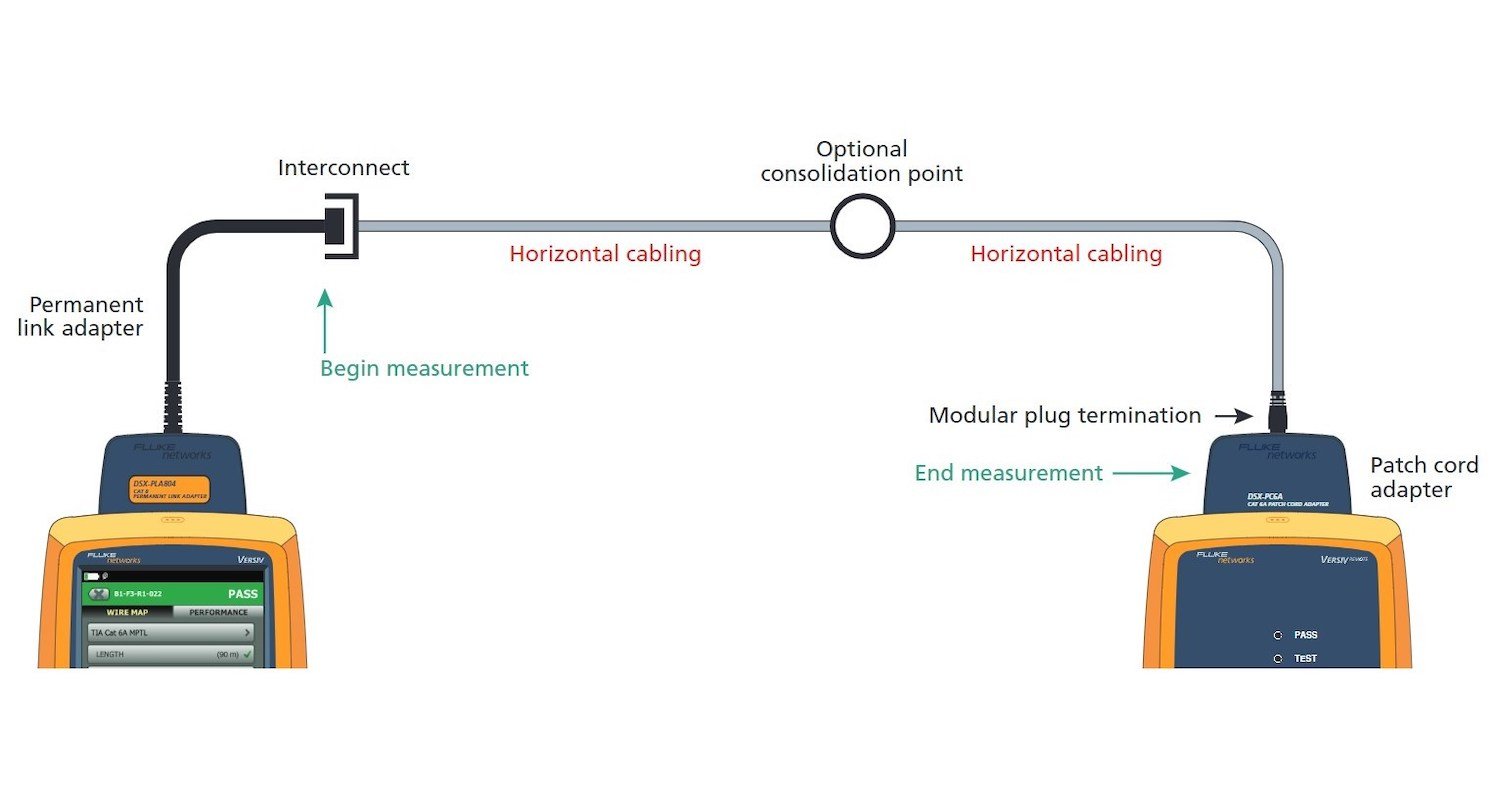
n.°6: Olvidar habilitar los datos de trazado para los resultados de la comprobación
Los datos de trazado son la representación gráfica a todo color de los parámetros de comprobación medidos necesarios para las comprobaciones de certificación. Para la certificación de cobre, los datos de trazado incluyen gráficos para parámetros clave, como la pérdida de inserción (IL), la pérdida de retorno (RL), la diafonía en el extremo cercano y en el extremo lejano (NEXT, PSNEXT, PSACRN, ACRF, PSACRF) y Alien Crosstalk (PS ANEXT y PS AACR-F). Cada gráfico muestra los decibeles (dB) en el eje Y y la frecuencia en el eje X. La frecuencia varía dependiendo del tipo de cableado que se comprueba: hasta 100 MHz para la categoría 5e, 250 MHz para la categoría 6 y 500 MHz para la categoría 6A. Tenga en cuenta que también puede ampliar la frecuencia, lo que puede ser útil para la recertificación de un cable conforme a una norma más alta.
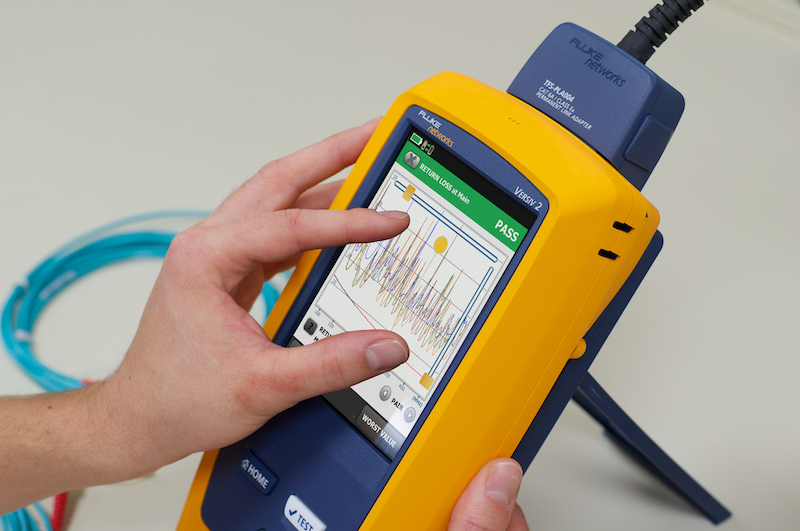
Para cada gráfico, la línea roja lisa muestra los límites de la comprobación de la norma conforme a la que está comprobando (es decir, TIA, ISO/IEC, etc.). Las líneas irregulares de color muestran los resultados de pares individuales y pares de combinaciones. Estas líneas son irregulares ya que los resultados reales suelen tener picos y valles, lo que no es un problema siempre y cuando se mantengan por encima del límite.

Es fundamental habilitar los datos de trazado, ya que suelen ser necesarios para la comprobación de certificación y muestran información visual valiosa sobre el rendimiento de los pares individuales dentro del cable. También es la única manera de diagnosticar verdaderamente cuál podría ser la causa de un problema con el enlace sometido a comprobación, dado que puede ver dónde se está produciendo la diafonía. También debe habilitar los datos de trazado con su comprobador DSX CableAnalyzer para incluir los parámetros de diafonía en el dominio del tiempo de alta definición (HDTDX) y reflectometría en el dominio del tiempo de alta definición (HDTDR) que muestran información de dominio en el tiempo para indicar la ubicación en el enlace sometido a comprobación donde la diafonía o la pérdida de retorno son excesivas.
Los datos de trazado también son esenciales si necesita asistencia para la resolución de problemas por parte de Fluke Networks. Si no dispone de datos de trazado disponibles para que los analicen nuestros expertos técnicos, le pediremos que vuelva a realizar la comprobación con los datos de trazado habilitados, lo que duplicará el tiempo de comprobación. Por fortuna, la configuración predeterminada para el certificador DSX CableAnalyzer es mostrar y guardar datos de trazado para las comprobaciones basadas en frecuencia requeridas por el límite de comprobación seleccionado. Como mínimo, se recomienda mantenerlo de esa manera. Si se elige “ampliada”, se guardarán los datos más allá de la gama de frecuencias del límite de comprobación seleccionado. Además, su cliente apreciará la visualización del margen: los informes sin datos de trazado se verán vacíos.
n.°7: Omitir la inspección y limpieza adecuadas de la fibra
A pesar de los constantes recordatorios y de la educación sobre la importancia de inspeccionar las terminaciones de fibra, las conexiones contaminadas siguen siendo la principal causa de problemas y fallos en las redes de fibra. Ya sea en una conexión cruzada de fibra, en un puerto de equipo o en el extremo de un puente, dondequiera que haya una terminación de fibra expuesta, se corre el riesgo de contaminación y de terminar con partículas en el núcleo de la fibra que pueden causar pérdidas y reflexiones. Omitir o simplemente olvidar inspeccionar y limpiar correctamente la fibra antes de realizar esa conexión final puede marcar la diferencia entre pasar a su siguiente trabajo con un cliente satisfecho e invertir tiempo (y dinero) adicional en resolver un problema.
Al inspeccionar las terminaciones de fibra, una inspección manual rápida con un microscopio de fibra no es suficiente. El nivel de experiencia, la iluminación ambiental, la vista e incluso las prisas o el cansancio pueden influir en su capacidad de inspeccionar correctamente una terminación de fibra.
La buena noticia es que hay una norma de inspección de fibra para ayudar a agilizar el proceso y eliminar cualquier subjetividad humana. La norma IEC 61300-3-35 sobre procedimientos básicos de comprobación y medición para dispositivos de interconexión de fibra óptica y componentes pasivos proporciona un proceso recomendado de limpieza e inspección que incluye criterios específicos de evaluación de la limpieza en función de la cantidad y el tamaño de los arañazos y defectos que se encuentran en las zonas críticas del núcleo y el revestimiento de la terminación de una fibra. Seguir esta norma puede ayudar a evitar la sustitución innecesaria y costosa de cables o equipos.

Una noticia aún mejor es que las herramientas de inspección de fibra de Fluke Networks proporcionan un sistema de PASA/FALLA automatizado basado en la norma IEC 61300-3-35.
n.°8: No usar la referencia de un puente para comprobaciones de fibra de nivel 1
En el caso de las comprobaciones de fibra de nivel 1, “pérdida de conector” se refiere a la pérdida de un par de conectores acoplados. Es esencialmente imposible medir la pérdida de un solo conector. La comprobación de un enlace de fibra permanente, por ejemplo, de un panel de conexión a otro, debería incluir la pérdida tanto del primero como del último conector, dado que así es como se usará la instalación del cableado. Para medir la pérdida de estos conectores, deben acoplarse a un conector de calidad similar usando cables de referencia de comprobación (TRC).
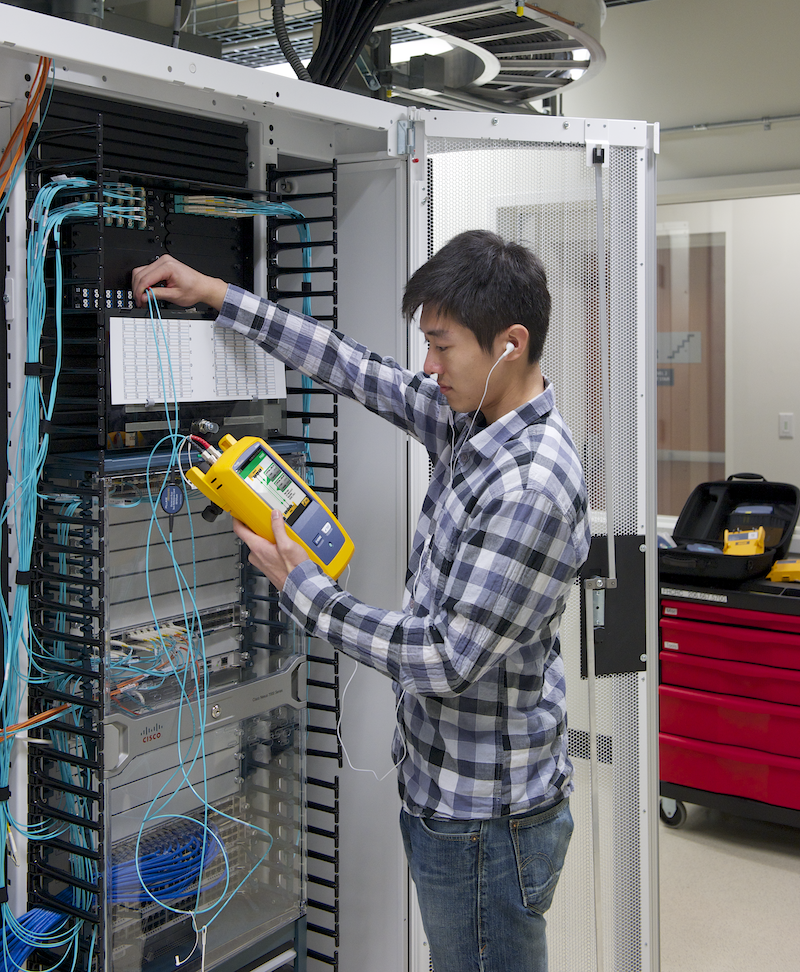
Cuando se usa un TRC, el comprobador debe considerar la pérdida del TRC estableciendo una referencia, que es como colocar un tazón en una báscula y luego calibrar la báscula a cero para pesar con precisión lo que ponga en el tazón. Las normas del sector recomiendan usar el método de referencia de un puente para establecer una referencia. Esto permite que la comprobación incluya la pérdida de las conexiones en ambos extremos del canal. Dado que la mayor parte de la pérdida de un canal es causada por estas conexiones, el método de referencia de un cable ofrece la precisión más alta.
Si bien una referencia de dos puentes podría parecer más lógica, esta referencia excluye la conexión entre los dos puentes y, en definitiva, incluye la conexión de un solo extremo en la medición de pérdida. Solo representa parcialmente la pérdida total y puede dar lugar a resultados demasiado optimistas o incluso negativos. Una pérdida tan negativa causada por una referencia de dos cables generará una advertencia y un resultado de FALLA en el juego de comprobación de pérdida óptica CertiFiber Pro® de Fluke Networks. Además, varios proveedores de cableado rechazarán resultados obtenidos con una referencia de dos cables y eso podría impedirle adquirir una garantía.
Al establecer la referencia, el comprobador CertiFiber Pro ofrece un asistente de establecimiento de referencia que le guía paso a paso por el proceso usando animaciones. Le muestra exactamente cómo conectar los TRC a su unidad principal y unidades remotas. Una vez que se establece la referencia, el asistente le indicará cómo desconectar los TRC desde los puertos de entrada.
n.°9: Usar el cable de referencia equivocado para la comprobación de fibra
Cuando certifique una instalación de cableado de fibra óptica, use solo TRC recomendados por el fabricante del equipo de comprobación. Los TRC auténticos, como los que ofrece Fluke Networks, están fabricados con cables y conectores de calidad de referencia con una pérdida muy baja mejor que 0,1 dB para multimodo y 0,2 dB para monomodo. Cualquier cosa que no sea un TRC auténtico podría provocar fallos falsos, y el impacto en sus resultados finales puede costarle mucho más que lo que se ahorre comprando un sustituto barato. Imagine tener que reinstalar un enlace de fibra que habría pasado si hubiese usado los TRC recomendados en primer lugar.
Independientemente de qué TRC use, es una mejor práctica verificar el rendimiento de los TRC antes de comenzar la comprobación. Esto le indica que cuando un enlace falla, no ha sido por culpa de TRC deficientes. Le recomendamos verificar sus TRC cada 288 comprobaciones y documentar los resultados, de modo que tenga una referencia para determinar si sus TRC están desgastados y deben sustituirse. El asistente del comprobador CertiFiber Pro le guía paso a paso por el proceso de verificación de los TRC.
También es esencial usar el tipo correcto de TRC. En el caso de la fibra multimodo, las normas del sector exigen comprobaciones de flujo restringido (Encircled Flux, EF) que se ajusten más a las condiciones de lanzamiento de los transceptores de fibra óptica actuales. Las comprobaciones de EF reducen la incertidumbre de las mediciones, evitan resultados demasiado optimistas y son un requisito de los proveedores de cableado para adquirir una garantía. Cuando se realizan comprobaciones de fibra multimodo, necesita un comprobador que cumpla con EF, como el OLTS CertiFiber Pro, junto con TRC que cumplan con EF.
Aunque las comprobaciones de EF cumplen la norma y son la mejor práctica, si sigue usando un cilindro para fibra común para controlar las condiciones de lanzamiento y mejorar la precisión eliminando los modos de orden más alto, preste especial atención a los TRC. Si escatima en gastos y usa cables típicos, podrían estar fabricados con fibra multimodo insensible a la curvatura (BIMMF). Dado que la BIMMF resiste dobleces más cerrados con una pérdida de señal sustancialmente menor, el uso cables de comprobación BIMMF junto con un cilindro para fibra no elimina los modos de orden más alto. Más aún, las normas del sector indican que los cables de comprobación no deben ser BIMMF, aunque el enlace que está comprobando use BIMMF. Las comprobaciones de EF con nuestros TRC no BIMMF es un método mucho más preciso de comprobar fibra multimodo, motivo por el cual las normas del sector así lo exigen.
n.°10: Confiar en un comprobador dúplex para la certificación de cables MPO
La mayoría de los enlaces de fibra de alta velocidad de 100 a 800 gigabits en el centro de datos dependen de soluciones de conectores multifibra de presión (MPO). Las pruebas de campo son la única forma de asegurarse de que los enlaces de MPO cumplan con los requisitos del rendimiento de aplicaciones. Parece lógico que comprobar un enlace de fibra MPO multifibra con un comprobador dúplex lleve mucho tiempo. En efecto, la comprobación de un enlace terminado a conectores MPO de 12 fibras con un comprobador dúplex requiere unos 15 pasos con un método de tres puentes y el uso de cables de distribución MPO a LC o casetes MPO a LC de baja pérdida que separan el cable de 12 fibras en canales de una sola fibra.
Para comprobar los MPO con un comprobador dúplex, primero debe verificar y configurar los cables de referencia de comprobación SC-LC y LC-LC. Un tercer cable de referencia de comprobación LC debe verificarse, configurarse y quitarse antes incluso de conectar al primer par de fibras en los MPO, y hay cinco pares más que comprobar en ambos extremos. Este proceso complejo que requiere mucho tiempo tiene el potencial inherente de mayores incoherencias y hace que sea más complejo mantener todos los conectores limpios durante el proceso.

Los comprobadores con un conector MPO integrado ahorran complejidad, tiempo e incoherencias de las comprobaciones de MPO porque eliminan la necesidad del casete o cable de distribución. El medidor de potencia óptima MultiFiber™ Pro de Fluke Networks ofrece esta funcionalidad, que permite escanear en simultáneo todas las fibras y mostrar los resultados de la comprobación en un gráfico de barras fácil de leer. El comprobador MultiFiber Pro puede identificar cada fibra del MPO, proporcionar datos más precisos por fibra y generar informes para mejorar la verificación de conectores MPO y la resolución de problemas. Incluso puede comprobar la polaridad correcta, lo que garantiza una conexión continua del transmisor al receptor. El comprobador MultiFiber Pro le permite comprobar la polaridad correcta de latiguillos individuales, enlaces permanentes y canales sin conocimiento previo de la polaridad del enlace.
La próxima vez que crea que un comprobador dúplex será suficiente para su comprobación de MPO, recuerde que un comprobador con una interfaz de MPO integrada como MultiFiber Pro eliminará la complejidad y le permitirán realizar comprobaciones un 90% más rápido.




